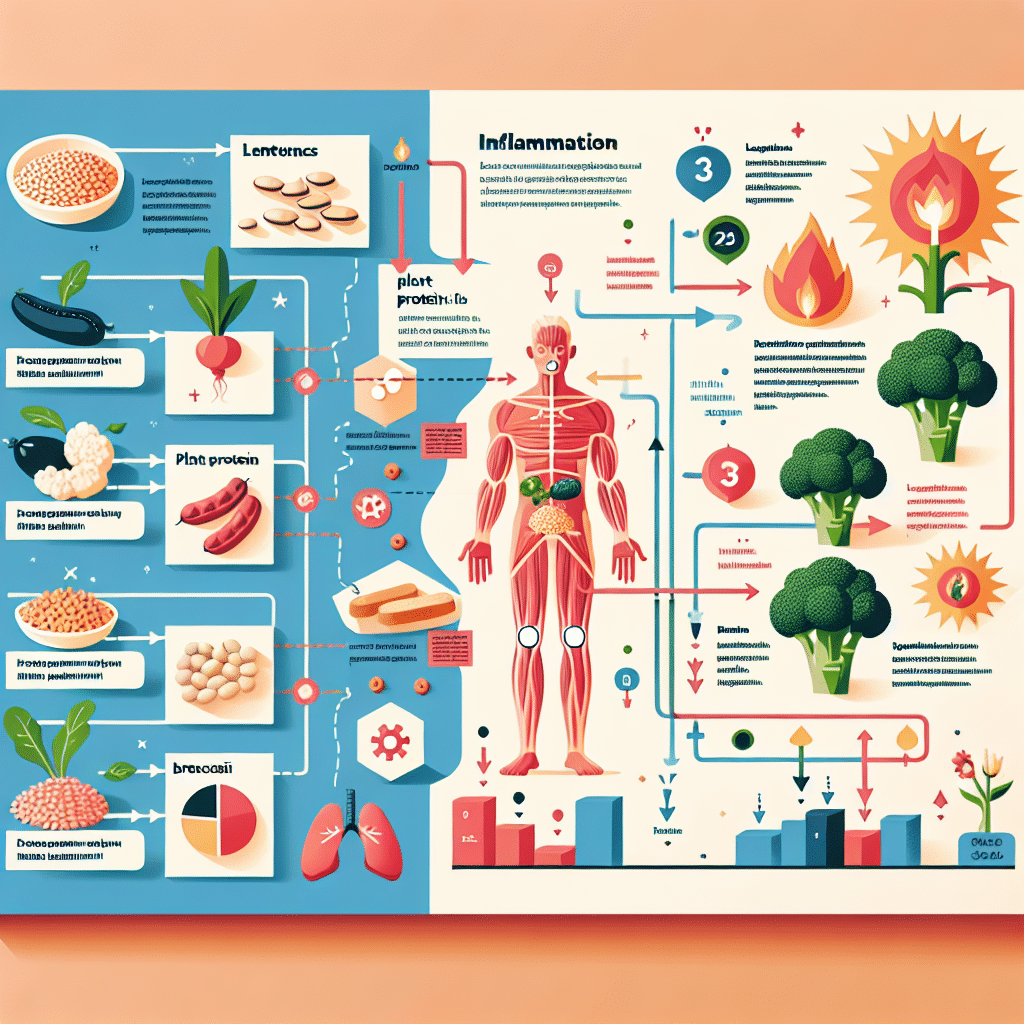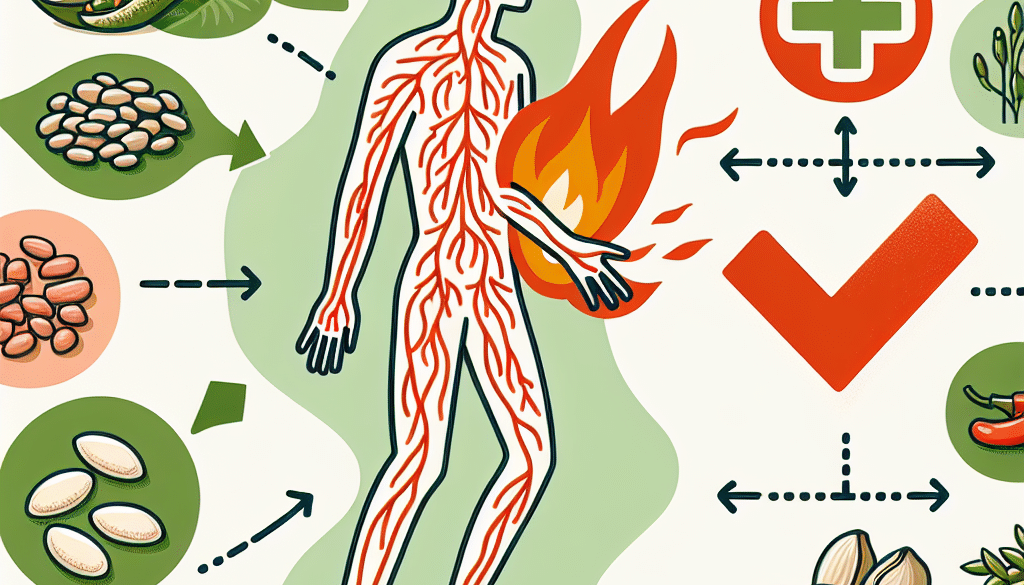Is Plant Protein Inflammatory?
-
Table of Contents
- Plant Protein and Inflammation: Unveiling the Truth
- Understanding Inflammation
- Plant Proteins: An Overview
- The Anti-Inflammatory Properties of Plant Proteins
- Case Studies and Research on Plant Protein and Inflammation
- Plant Proteins and Potential Inflammatory Concerns
- Comparing Plant and Animal Proteins
- Conclusion: Embracing Plant Proteins for Reduced Inflammation
- Discover ETprotein’s Premium Plant Proteins
Plant Protein and Inflammation: Unveiling the Truth

In recent years, plant-based diets have gained popularity, with many individuals turning to plant proteins as a healthier alternative to animal proteins. However, there has been an ongoing debate about whether plant proteins can cause inflammation. This article delves into the scientific evidence to explore the inflammatory potential of plant proteins and provides insights into their health implications.
Understanding Inflammation
Inflammation is the body’s natural response to protect itself against harm. There are two types of inflammation: acute and chronic. Acute inflammation is the immediate response to an injury or infection, which is essential for healing. Chronic inflammation, on the other hand, can lead to various diseases, including heart disease, diabetes, and cancer. The role of diet in inflammation is crucial, as certain foods can either exacerbate or reduce inflammatory processes.
Plant Proteins: An Overview
Plant proteins are derived from various sources, including legumes, grains, nuts, seeds, and vegetables. Unlike animal proteins, plant proteins contain fiber and phytonutrients, which have been associated with anti-inflammatory properties. However, the question remains: do plant proteins themselves contribute to inflammation?
The Anti-Inflammatory Properties of Plant Proteins
Several studies have suggested that plant proteins can have anti-inflammatory effects. Here are some key points supporting this view:
- Plant proteins are rich in antioxidants, which help neutralize free radicals and reduce oxidative stress, a key factor in inflammation.
- They contain bioactive compounds such as flavonoids and polyphenols, known for their anti-inflammatory properties.
- High fiber content in plant proteins can promote a healthy gut microbiome, which is linked to reduced inflammation.
- Plant-based diets are associated with lower levels of C-reactive protein (CRP), a marker of inflammation in the body.
For instance, a study published in the Journal of the American College of Cardiology found that higher intake of plant proteins was associated with lower levels of inflammatory markers in the bloodstream.
Case Studies and Research on Plant Protein and Inflammation
Research has provided evidence that certain plant proteins may have anti-inflammatory effects. For example, a study in the Nutrition Journal showed that pea protein hydrolysate had anti-inflammatory properties in rats. Another study in the European Journal of Nutrition found that soy protein could reduce inflammation markers in overweight and obese individuals.
Moreover, epidemiological studies have consistently shown that populations consuming diets rich in plant-based foods have lower rates of inflammatory diseases. These findings suggest that plant proteins, as part of a whole-foods plant-based diet, may contribute to reduced inflammation.
Plant Proteins and Potential Inflammatory Concerns
While the majority of evidence points towards the anti-inflammatory benefits of plant proteins, there are some considerations to keep in mind:
- Some plant proteins contain lectins and phytates, which in large amounts can interfere with nutrient absorption and potentially lead to inflammation.
- Individuals with allergies to specific plant proteins, such as soy or gluten, may experience inflammatory responses upon consumption.
- Over-processing of plant proteins can strip away beneficial nutrients and lead to the inclusion of additives that may trigger inflammation.
It is important to consume a variety of plant proteins and to prepare them properly to minimize any potential adverse effects.
Comparing Plant and Animal Proteins
When comparing the inflammatory potential of plant and animal proteins, research tends to favor plant proteins. Animal proteins, particularly red and processed meats, have been associated with higher levels of inflammation. The saturated fat and heme iron found in animal proteins are thought to be contributing factors to their inflammatory potential.
Conversely, plant proteins are naturally lower in saturated fat and do not contain heme iron, which may explain their lower inflammatory impact.
Conclusion: Embracing Plant Proteins for Reduced Inflammation
In conclusion, the current body of scientific evidence suggests that plant proteins are not inherently inflammatory. In fact, they may offer anti-inflammatory benefits, especially when consumed as part of a balanced and varied diet. It is important to choose whole, minimally processed plant proteins and to be mindful of individual allergies and sensitivities.
The key takeaways from this article are:
- Plant proteins are generally associated with reduced inflammation due to their antioxidant, fiber, and phytonutrient content.
- Research supports the anti-inflammatory effects of plant proteins, with several studies showing a decrease in inflammation markers.
- While there are potential concerns with certain plant proteins, these can be mitigated through proper selection and preparation.
- Compared to animal proteins, plant proteins appear to have a lower inflammatory impact.
By incorporating a variety of plant proteins into your diet, you can enjoy the health benefits they offer while potentially reducing your risk of chronic inflammation and related diseases.
Discover ETprotein’s Premium Plant Proteins
If you’re looking to incorporate high-quality plant proteins into your diet, ETprotein offers a range of organic bulk vegan proteins that are non-GMO, allergen-free, and characterized by a neutral taste. Their products include Organic rice protein, clear rice protein, pea protein, clear pea protein, and many more, catering to a diverse range of dietary preferences and needs.
ETprotein’s commitment to purity and quality makes their plant proteins an excellent choice for those seeking to reduce inflammation and improve overall health. To learn more about their offerings or to sample their products, contact ETprotein today.
About ETprotein:
ETprotein, a reputable protein and L-(+)-Ergothioneine (EGT) Chinese factory manufacturer and supplier, is renowned for producing, stocking, exporting, and delivering the highest quality organic bulk vegan proteins and L-(+)-Ergothioneine. They include Organic rice protein, clear rice protein, pea protein, clear pea protein, watermelon seed protein, pumpkin seed protein, sunflower seed protein, mung bean protein, peanut protein, and L-(+)-Ergothioneine EGT Pharmaceutical grade, L-(+)-Ergothioneine EGT food grade, L-(+)-Ergothioneine EGT cosmetic grade, L-(+)-Ergothioneine EGT reference grade and L-(+)-Ergothioneine EGT standard. Their offerings, characterized by a neutral taste, non-GMO, allergen-free attributes, with L-(+)-Ergothioneine purity over 98%, 99%, cater to a diverse range of industries. They serve nutraceutical, pharmaceutical, cosmeceutical, veterinary, as well as food and beverage finished product distributors, traders, and manufacturers across Europe, USA, Canada, Australia, Thailand, Japan, Korea, Brazil, and Chile, among others.
ETprotein specialization includes exporting and delivering tailor-made protein powder and finished nutritional supplements. Their extensive product range covers sectors like Food and Beverage, Sports Nutrition, Weight Management, Dietary Supplements, Health and Wellness Products, and Infant Formula, ensuring comprehensive solutions to meet all your protein needs.
As a trusted company by leading global food and beverage brands and Fortune 500 companies, ETprotein reinforces China’s reputation in the global arena. For more information or to sample their products, please contact them and email sales(at)ETprotein.com today.












